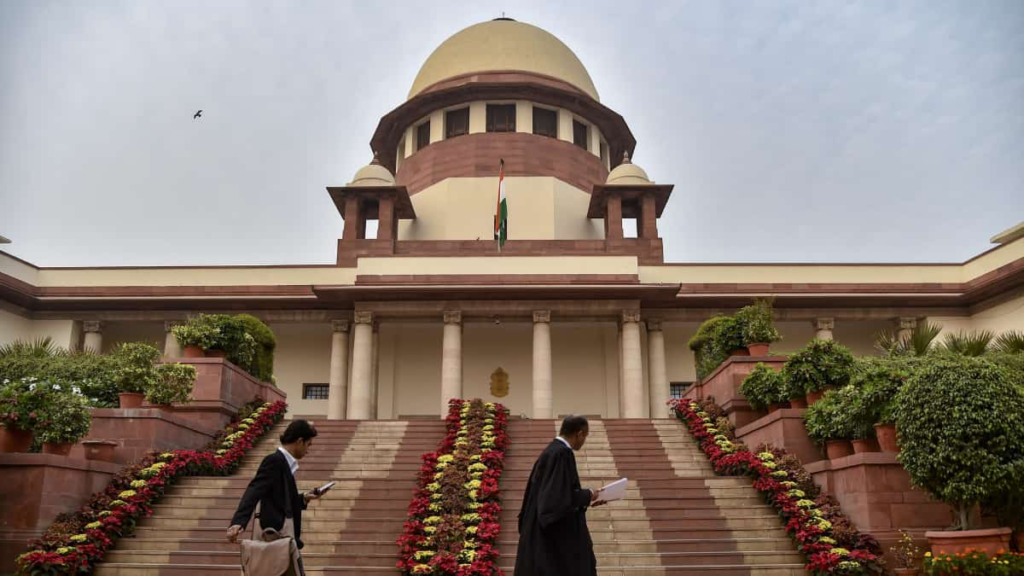
Secularism always held to be part of Indian constitution’s basic structure: Supreme Court
The Supreme Court on Monday said secularism has always been held to be part and parcel of the basic structure of the Indian Constitution, and the terms “socialist” and “secular” need not be considered like a western concept. The words “socialist” and “secular” were inserted into the Preamble to the Constitution under the 42nd constitutional amendment moved by the Indira Gandhi government in 1976.
The amendment changed the description of India in the Preamble from a “sovereign, democratic republic” to a “sovereign, socialist, secular, democratic republic”.
A bench comprising Justices Sanjiv Khanna and Sanjay Kumar made the remark while hearing a batch of petitions filed by former Rajya Sabha MP Subramanian Swamy, advocate Vishnu Shankar Jain and others, who have challenged the inclusion of the words “socialist” and “secular” in the Preamble to the Constitution.
“This court has, in a number of judgments, held that secularism was always part of the basic structure of the Constitution. If one looks at the right to equality and the word ‘fraternity’ used in the Constitution, there is a clear indication that secularism has been held as the core feature of the Constitution,” the bench said.
“I can cite cases for you. When secularism was debated, there was only the French model. The Supreme Court has struck down statutes that go against secularism. You may look at Article 25. For socialism, we have not followed the western concept and we are happy about it,” Justice Khanna told the petitioners.
During the hearing, Jain submitted that B R Ambedkar had opined that the inclusion of the word “socialism” would curtail personal liberty. He added that the Preamble to the Constitution cannot be amended through amendments.
“Please see the implications. These words, secular and socialist, were not debated in Parliament. It is against the founding father’s idea. Please allow us to raise this issue. Issue notice on this,” Jain submitted.
Justice Khanna asked Jain, “You don’t want India to be secular?”
Jain submitted that he did not mean that India is not secular but is against the amendment made to incorporate these two words — secular and socialist — into the Preamble to the Constitution.
Justice Khanna said there were different meanings of socialism and one “should not take the meaning adopted in western countries”.
“Socialism can also mean there has to be a fair opportunity for all — the concept of equality. Let us not take it as a western concept. It can have some different meanings as well. Same goes with the word secularism,” he said.
Advocate Ashwini Upadhyay, who too has filed a petition, said he is neither against the words “socialist”, “secular” and “integrity” nor their insertion in the Constitution, but he is against the insertion of these words into the Preamble in 1976 and that too with a retrospective effect from November 26, 1949.
He said adding a word did not have any real effect in the country but opened a pandora’s box for the future governments, who can play with it and may remove a word from the Preamble.
Swamy, on the other hand, submitted that the Preamble was a declaration made on November 26, 1949 and therefore, adding further words to it through a subsequent amendment was arbitrary.
He said it was wrong to depict that according to the present Preamble, the Indian people agreed on November 26, 1949 to make the country a socialist and secular republic. The bench said it would examine the matter and posted it for further hearing on November 18.
On February 9, the top court had questioned whether the Preamble to the Constitution could be amended while keeping the date of its adoption, November 26, 1949, intact.
“For the academic purpose, can a Preamble that has the date mentioned be changed without altering the date of adoption? Otherwise, yes the Preamble can be amended. There is no problem with that,” the bench had said.
Jain said the Preamble to the Constitution comes with a specific date and therefore, it cannot be amended without a discussion.
Swamy said the 42nd Amendment Act was passed during the Emergency (1975-77).
On September 2, 2022, the top court had tagged Swamy’s plea with other pending matters — filed by one Balram Singh and others — for hearing.
Both Swamy and Singh have sought deletion of the words “socialist” and “secular” from the Preamble to the Constitution.
Swamy, in his plea, has contended that the Preamble cannot be altered, varied or repealed.
He has said the Preamble not only indicates the essential features of the Constitution but also the fundamental conditions based on which it was adopted to create a unified integrated community.
Disclaimer: This story has been published from a news agency feed with minimal edits to adhere to WION’s style guide. The headline may have been changed to better reflect the content of the story or to make it more suitable for WION audience.





Responses